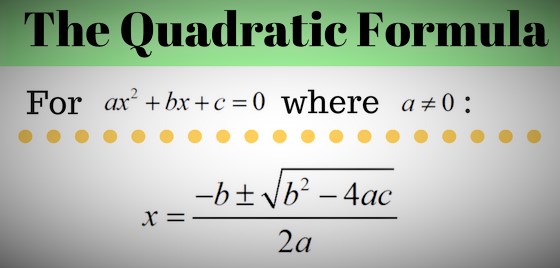Quadratic Formula Derivation: Again there are some quadratic polynomials that are not factorable at all using integral coefficients. In such a case we can always find the solution of a quadratic equation by the quadratic formula.
![]() by applying a formula known as the quadratic formula. This formula is applicable for every quadratic equation.
by applying a formula known as the quadratic formula. This formula is applicable for every quadratic equation.
- Derivation of Quadratic Formula

The standard form of a quadratic equation is
![]()
Step 1. Divide the equation by a
![]()
Step 2. Take constant term to the R.H.S
![]()
Step 3. To complete the square on the L.H.S. add ![]() to both sides
to both sides
![]()
![]()
![]()
![]()
![]()
Hence the solution of the quadratic equation ![]() is given by
is given by
![]()
which is called Quadratic formula.
- Example 1: Solve the equation
 by using the quadratic formula.
by using the quadratic formula.
Solution:
Comparing the given equation with
![]() ,
,
we get,![]() ,
,
∴ The solution is given by
![]() ,
,
![]() ,
,
![]() ,
,
![]()
![]() ,
,
- Example 2: Solve the equation
 by using the quadratic formula.
by using the quadratic formula.
Solution:
Comparing the given equation with
![]() ,
,
we get,![]() ,
,
∴ The solution is given by
![]() ,
,
![]() ,
,
![]() ,
,
![]() ,
,
![]() ,
,
you can also check from.
